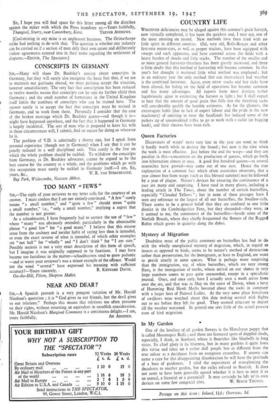TOO MANY FEWS "
Snt,—The reply of your reviewer to my letter calls for the courtesy of an answer. I must confess that I am not entirely convinced. "A few" surely means "a small number," and "quite a few" should mean "quite a small number," i.e., "only a small number," implying a regret that the number is not greater. As a schoolmaster, I have frequently had to correct the use of "few" where " many " was obviously intended; particularly in the abominable phrase "a good few" for "a good many." I believe that this misuse arose from the cockney and jocular habit of saying less than is intended, or even the exact reverse of what is intended, of which other examples are "not half" for " wholly " and "I don't think" for "I am sure." Possibly meiosis is not a very exact description of this form of speech, but I imagine it was originally supposed to be facetious. I may have become too fastidious in the matter—schoolmasters tend to grow pedantic —and at worst your reviewer's was a minor example of the offence. Would not the word "several" have expressed his meaning with sufficient accuracy?—Yours sincerely, - R. KENNARD DAVIS. On-the-Hill, Pilwn, Shepton Mallet.


































 Previous page
Previous page